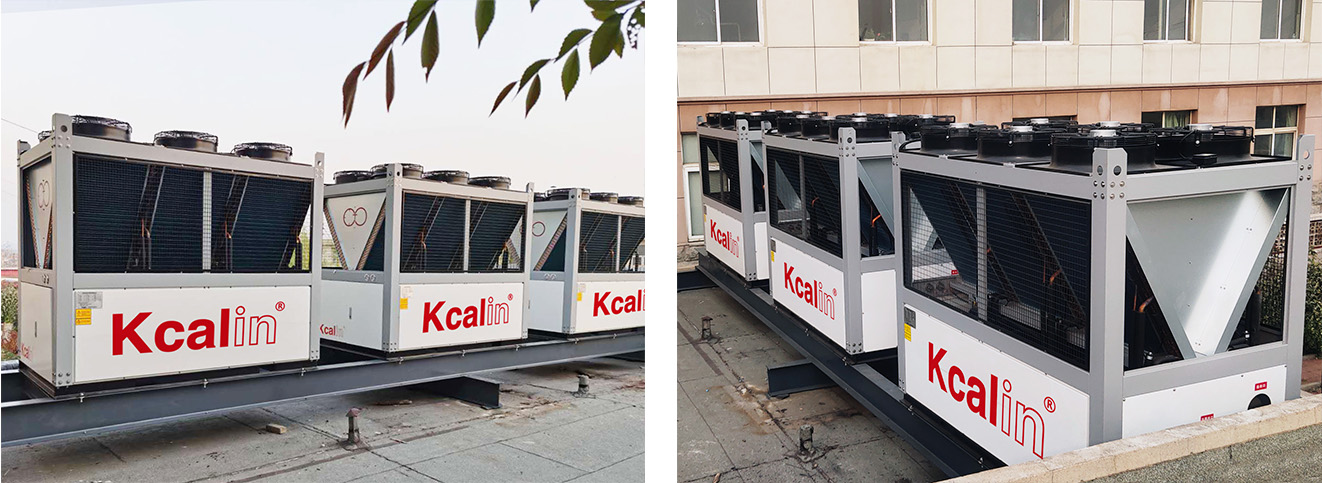Air energy heat pumps and air-cooled heat pumps, as two common energy-saving devices, are widely used in residential, commercial, and industrial fields due to their various advantages. Today, the editor has compiled the working principles, advantages and disadvantages, and applicable scenarios of air energy heat pumps and air-cooled heat pumps to help you choose suitable energy-saving equipment.
The working principle of an air energy heat pump is to use the heat in the air to heat the refrigerant through a reverse Carnot cycle. After being compressed by a compressor, the heat is transferred to the water supply, thereby achieving heating, cooling, or providing hot water. The specific steps are as follows:
Evaporation: The heat in the air is absorbed by the evaporator, and the low-temperature and low-pressure refrigerant becomes gaseous during this process.
Compression: The gaseous refrigerant is compressed by a compressor to become a high-temperature and high-pressure gas.
Condensation: High temperature and high pressure refrigerant enters the condenser, releasing heat to heat water, while the refrigerant becomes liquid.
Throttling: The liquid refrigerant is depressurized and cooled through a throttle valve, and then enters the evaporator for further circulation.

The working principle of air-cooled heat pumps is similar to that of air energy heat pumps, but their heat and cold sources come from other environmental heat sources outside of air, such as water or ground sources. The basic workflow of the air-cooled heat pump is also divided into four steps: evaporation, compression, condensation, and throttling. However, the air-cooled heat pump mainly exchanges heat with the external air through the fan and condenser.
The advantages of air energy heat pumps:
Energy saving and efficiency: The energy efficiency ratio (COP) of air energy heat pumps is generally above 3.0, and inputting one part of electrical energy can output more than three parts of thermal energy, which has a good energy-saving effect.
Environmentally friendly and pollution-free: During operation, there is no generation of exhaust gas, wastewater, or smoke, and the environmental performance is superior, which helps to improve air quality.
Widely applicable: Suitable for various climate conditions, it can operate stably even in low temperature environments, and is widely used in residential, commercial, and industrial fields.
High safety: It does not involve the combustion process, has no risk of open flames and harmful gas leakage, and is safe and reliable.
Disadvantages of air energy heat pumps:
High initial investment: The equipment and installation costs of air energy heat pumps are relatively high, resulting in a larger initial investment.
High dependence on ambient temperature: In extremely cold environments, the energy efficiency of air energy heat pumps will decrease, and auxiliary heating equipment is needed to supplement.
Advantages of air-cooled heat pumps:
Good energy-saving effect: air-cooled heat pumps also have a high energy efficiency ratio, which can reduce operating costs.
Wide application range: air-cooled heat pumps are suitable for various environmental heat sources, with strong flexibility and the ability to adapt to different climate conditions and geographical environments.
Strong environmental friendliness: Like air energy heat pumps, air-cooled heat pumps do not produce harmful emissions during operation and have good environmental performance.
High stability: Due to the use of multiple environmental heat sources, air-cooled heat pumps have high operational stability and are not easily affected by a single environmental factor.
Disadvantages of air-cooled heat pumps:
High initial investment: The equipment and installation costs of air-cooled heat pump systems are also relatively high, especially when it comes to equipment involving ground and water sources, the initial investment is greater.
Complex maintenance: Due to the involvement of multiple environmental heat sources, the maintenance of air-cooled heat pump systems is relatively complex and requires regular inspection and maintenance by professional personnel.
As two efficient and energy-saving heating and cooling equipment, air energy heat pumps and air-cooled heat pumps have their own advantages and applicable scenarios. Air energy heat pumps are widely used in residential and small commercial areas due to their advantages of high efficiency, energy conservation, environmental safety, and wide applicability. Due to its high efficiency, energy conservation, strong adaptability, and stable operation, air-cooled heat pumps are suitable for large public buildings and industrial applications.
Choosing suitable energy-saving equipment requires comprehensive consideration of specific application needs, environmental conditions, and budget, and the rational utilization of the advantages of the two heat pumps to provide efficient and environmentally friendly heating and cooling solutions for different scenarios. Through scientific and rational selection and application, air energy heat pumps and air-cooled heat pumps will bring more comfort and convenience to our lives and work.







Comment